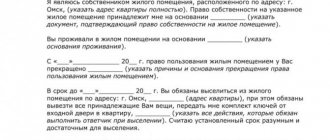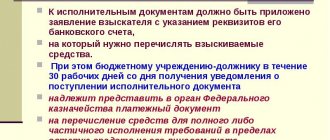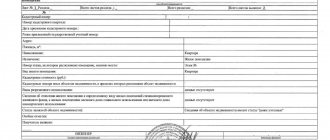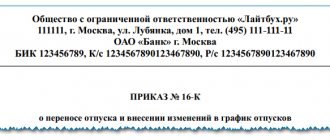All countries of the world are faced with the problem of collecting, transporting and properly disposing of solid household waste. Garbage accumulated in large quantities has a detrimental effect on the environmental situation. This problem also affected the Russian Federation.
After the introduction of changes to the existing rules regulating the removal of municipal waste in the Russian Federation, there was a sharp jump in prices for services. When municipal municipal services entrusted their function of removing household waste to a new entity - the regional operator, city residents and managers of various enterprises, a new category of MSW waste became of interest. They began to figure out what was included in this category of waste and how much it would cost to dispose of the remains of human activity.
Differences between MSW and MSW
Based on Article 1 of Federal Law No. 89, municipal solid waste means garbage that accumulates in premises where any human activity occurs. This applies to apartments, offices, businesses, shops and other facilities.
If we compare MSW and MSW, in the latter case, garbage appears in the process of human activity in the place of permanent residence:
- cooking;
- cleaning of premises;
- in-line minor repairs;
- throwing away furniture, equipment and other items.
Municipal solid waste covers a wider range. This is not only the garbage taken out daily by residents of apartments and houses, but also waste from various companies and enterprises.
Based on the bill adopted in 2014, the term MSW was abolished. Although they have not stopped using it in everyday life. In official usage, the concept was replaced by the abbreviation TKO, which is now indicated in all payments.
MSW - current rules for 2021
In accordance with changes in Federal legislation, all regions of the Russian Federation are developing individual transport schemes for solid waste removal. Based on the wording of Article 1 of Federal Law No. 89, MSW is:
- waste resulting from human activities at home;
- waste remaining after the work of legal entities;
- equipment, furniture and other things unsuitable for their intended use.
After changes adopted in the legislative framework in 2021, the collection and disposal of MSW was identified as a separate category. Today, the provision of these services is entrusted to regional operators. For ease of payment, consumers are sent an individual payment order or the amount is indicated as a separate item on the invoice. Disposal prices are calculated based on the number of citizens registered in a particular territory.
Is it possible not to pay for the removal of solid waste if you are absent?
It is provided that if a family member (or the entire family) did not live in his apartment (private house) for some time, then there is no need .
Important: refusal of payment must be made application .
This means you need to do the following :
- contact a company that provides MSW management services;
- write an application for recalculation;
- attach a document confirming the absence of the tenant in the apartment (house).
*click on the picture to open it full size in a new window
Now you know what the line “MSW management” means on your receipt.
Read our blog and you will always be one step ahead of everyone. Good luck to you! See you soon on the blog pages KtoNaNovenkogo.ru
List of waste included in MSW
Previously, MSW meant ordinary garbage accumulated daily in houses intended for permanent residence. Conventionally, it was divided into two categories:
- non-biological;
- biological.
After changes were made to the legislation, garbage that was similar in appearance to household waste and received by legal entities and private entrepreneurs was added to the list of MSW. Comprehensive information about the types of waste included in the MSW list is freely available on the official portal of Rosprirodnadzor. The website also provides free consultation on the origin of household waste.
According to experts, MSW is part of the general classification of FKKO, the list of which includes:
- garbage after cleaning the territories of populated areas;
- litter of plant origin after cutting green spaces;
- office and household waste from different companies;
- garbage after the provision of trade, social, and entertainment services;
- large and small municipal waste;
- garbage from hotels, airports, train stations.
According to statistics, half of the garbage can be recycled. The remainder is disposed of or taken to landfills. The location of the landfill is selected by the regional administration after agreement with the residents of the city, village or other location.
Regulatory and legal framework
On the territory of the Russian Federation, they use regulatory technology for the collection and disposal of unnecessary material, broken down and expired household appliances. The calculation formula is applied to the residential sector and legal entities. To formulate standards, the following factors are taken into account:
- Method of supplying gas to residential premises or enterprises.
- Access to waste collection pipelines.
- Waste water removal and clean water supply system.
- Heating system for residential and non-residential premises.
- The overall size of a residential or non-residential property.
- Climatic features of a particular region.
When drawing up a contract for the removal and disposal of solid waste, information about the method of storing municipal waste is indicated. Based on current legislative standards, the document reflects the following information:
- access to containers;
- the presence of waste collection chambers;
- use of special transport;
- availability of waste storage bins;
- access to garbage chutes.
According to forecasts, a reduction in the volume of MSW accumulation is planned in the near future. This will reduce the number of landfills for waste collection and storage in all regions of the Russian Federation.
Changes in the List of Works on the Contents of the Visual Design in the MKD
Item 26 of the Minimum List of Services and Works Necessary to Ensure the Proper Maintenance of Common Property in an Apartment Building is proposed to be amended by adding a new list of works to ensure the removal of liquid household waste :
- maintenance of structures and equipment used for the accumulation of liquid household waste in apartment buildings that are not connected to a centralized drainage system;
- removal of liquid household waste from yard toilets located in the local area;
- removal of domestic wastewater from septic tanks located in the local area.
The list will also be supplemented with a new paragraph 26 (1), which provides a list of works on the maintenance of MSW accumulation sites :
- organization and maintenance of MSW accumulation sites, including maintenance and cleaning of garbage chutes, garbage collection chambers, container sites;
- organizing the collection of waste of I-IV hazard classes (used mercury-containing lamps, etc.) and their transfer to organizations that have licenses to carry out activities for the collection, use, neutralization, transportation and disposal of such waste.
Read more about recalculating fees for CG in this article
MSW disposal - common methods
The problem with municipal waste is relevant for all Russian regions. There are 4 waste disposal methods used in the Russian Federation. Typically, waste is recycled by:
- Burning. The method is financially economical. However, upon combustion, toxic substances are released into the atmosphere. This has a detrimental effect on the environmental situation in the country.
- Burials. The method is popular because it is inexpensive. But to meet the needs of the population for waste removal, especially in large cities, huge free areas are required.
- Composting. This option is used for waste of plant and food origin. The problem lies in the preliminary sorting of waste into organic and inorganic.
- Reusable. This method applies to artificial materials. Recycling is suitable for scrap metal, plastic and glass, which are recycled materials.
As of 2021, Russia does not have a rationally organized MSW management system compared to European countries. However, positive results are expected in the future thanks to the introduction of a new environmental program. It is aimed at improving the quality of waste sorting and recycling by up to 60% by 2024.
MSW: what is it in housing and communal services
It is logical that waste removal and recycling is the most important task of a special service. It is also logical that every work should be paid. That is why in receipts for payment of utility services there is such a line “ Payment for the treatment of solid waste ”.

The company that provides it is a regional operator (RO) . In the example above, this is JSC EcoProm-Lipetsk. The activities of the RO are licensed (that is, the company must obtain a license).
The operator is selected by regional authorities on a competitive basis. This can be one (less often 2 or 3) companies. Their number is determined depending on the volume of work and production capacity of the RO.
Regional operators enter into contracts with management companies (MCs) of apartment buildings for the provision of their services. As a rule, the management company includes the line “Management of solid waste” in the receipt with other utility payments.
MSW in the receipt for electricity and other “utilities” includes payment not only for the services of the RO, but also for the services of the management company (housing department, housing office, etc.) for the maintenance of the waste collection site.
Owners of private houses must enter into an agreement with the RO themselves. In this case, payment is made directly to the RO (as can be seen from the example above).
From January 1, 2021, the responsibility of the RO includes the following list of works within the framework of “MSW management”:
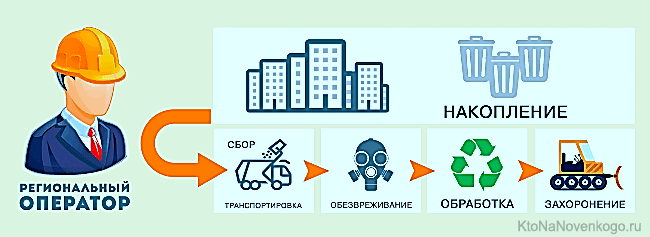
- MSW collection;
- waste transportation;
- MSW processing (preparation for subsequent disposal, i.e. sorting and disassembly);
- disposal;
- disposal of hazardous waste;
- disposal of MSW (storage and burial).
Continuation of reform
Waste reform began to be developed at the beginning of 2014. But complex changes made to the legislative framework made it possible to adopt the resolution only in 2021. The law reflects new conditions and requirements for the collection and disposal of non-food waste. The abbreviation TKO first appeared in Article No. 89-FZ.
Among the main theses of the new reform it is worth highlighting:
- Separate waste collection system. Aimed at simplifying waste recycling and reusing secondary raw materials.
- Competitive selection of operators responsible for MSW management for specific regions. Allows you to improve the quality of services provided to the population.
- Changing the method of calculating tariffs. Funds received for waste removal will be used for the construction of waste processing and disposal plants.
Based on the adopted adjustments to the legislative framework in 2019, the management of MSW is entrusted to the regional subjects of the Russian Federation. Thanks to this, individual regions can independently choose the method of collection, accumulation, removal and location for the construction of a landfill where the remains of human activity will be stored.
Legislative regulation
The problem of waste removal and disposal is so important that it is regulated at the legislative level. The main points of MSW management are spelled out in Federal Law (FZ) of the Russian Federation No. 89-FZ dated June 24, 2008, entitled “On production and consumption waste.”
This legislative act was adopted to enable legal regulation of MSW management in order to prevent harmful effects on public health and the environment.
Housing Code (LC) of the Russian Federation in Art. 154 (part 4) indicates that the management of solid waste is included in utilities and homeowners in an apartment building are required to pay for this service :
Utility fees include fees for cold water, hot water, electrical energy, thermal energy, gas, domestic gas in cylinders, solid fuel in the presence of stove heating, fees for wastewater disposal, and management of solid municipal waste.
If the agreement between the management company was concluded earlier than January 1, 2021 for a period of 10 years or more, then it is included in the costs of maintaining the residential premises. This is stated in the Federal Law of the Russian Federation No. 458-FZ dated December 21, 2014 (Article 23, Part 9):
The provisions of Part 4 of Article 154 of the Housing Code of the Russian Federation and parts 6.2, 6.3, 7.1 of article 157, parts 2.1, 11.1, 12, 15.1 of article 161, part 2 of article 164 of the Housing Code of the Russian Federation (as amended by this Federal Law) regarding the management of municipal solid waste.
The fee for the management of solid municipal waste is included in the fee for the maintenance of residential premises for owners of premises and tenants of residential premises located in apartment buildings specified in paragraph 1 of this part.
